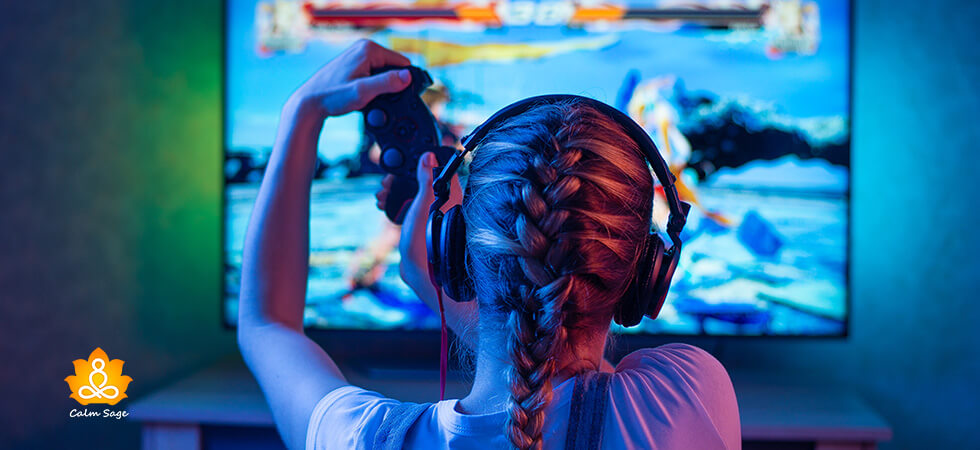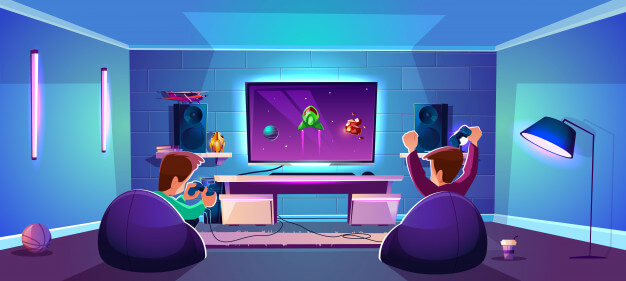Are Video Games Good For Your Mental Health?

If I ask you, “Are video games good for your mental health or not?” what will be your response to it?
Well, looking back at the research findings and what our elders have always been telling us for ages, your answer is likely to be a big “NO.” Which is usual and expected. But recent mental health research has something else to suggest, and we are here to share this news with you.
Also Read: 10 Best Apps For Brain Training Games To Improve Memory & Concentration
We bet this good news will leave you feeling happy. Before looking at the relationship between video games and mental as this new finding has suggested, let us see some interesting facts on the same.
- Video games are one of the most preferred leisure-time activities (with more than two and a half billion users worldwide).
- Just 0.3% of gamers are likely to experience problems controlling the time spent playing video games.
- Too much time spent playing video games can result in gaming addiction which if not taken care of may result in gaming disorder. Gaming disorder is a health condition where an individual prioritizes games over other life activities for more than 12 months (WHO).
- Amid the lockdown, there has been a surge in the number of video game sales around the world.
The last fact was the inspiration behind this research that was conducted by Oxford University. The paper was released on the 16th of November, 2020. The mental health news broke the internet as it suggested that yes Video Games Are Good For Your Mental Health!
Also Read: 5 Best Habit Tracker Apps in 2021 To Keep Your Mental Health Right
But how? Let us find out.
“The experiences during play may be even more important than the actual amount of time a player invests in games and could play a major role in the well-being of players,”
Professor Andrew Przybylski, the lead author of the study said.

The key findings from this mental health research are:
- The actual amount of time spent playing was a small but significant positive factor in people’s well-being.
- Subjective experiences of the player during play also influence well-being more than playtime alone.
- The level of enjoyment a player got from playing a game was a more crucial factor for their well-being (then playing time alone).
To Conclude:
“The study suggests that experiences of competence and social connection with others through play may contribute to people’s well-being. Indeed, those who derived enjoyment from playing were more likely to report experiencing positive well-being” (Professor Andy Przybylski, Author of the study)
Another research on reducing cognitive decline and slowing down brain aging:
With aging, cognitive decline can be expected and is as normal as the loss of muscle mass, according to neuroscientist Dr. Majid Fotuhi. However, he adds, that how regular exercise keeps older bodies healthy, similarly, healthy habits and brain exercises can reduce cognitive decline, slow brain aging, and improve cognitive functions.
In a 2022 study by the University of Utah, it was found that playing certain video games can help treat depression and mental decline. A 79-year-old woman, Pam Stevens was told that her cognitive impairment is incurable after the stroke she suffered in 2014. Her cognitive health was declining when she was referred by her psychiatrist to Sarah Shizuko Morimoto.
Morimoto’s work is focused on cognitive disorders especially related to brain aging, geriatric depression, and cognitive decline. She says,
“My interest has always been in the intersection between mood and cognition, so how you think affects how you feel. I started thinking ‘could we enhance the functioning of brain circuits through our eyes instead of our ears?‘”
This led to the creation of Neurogrow, a gardening video game designed to improve and increase neural circuitry. This game aims to target the brain to respond better to depression medications or antidepressants.
Neurogrow, a gardening video game, isn’t a high-quality video game like Call of Duty or Animal Crossing but with a simple design and basic graphics, the game portrays elaborate storytelling for tasks that stirs the brain’s memory and reaction time. Say, for example, if you’re playing Neurogrow, you’ll be presented with a specific colored flower and will be asked to water the flower with the matching watering can before you run out of time.
According to the creator, Morimoto,
“When you want a certain part of the brain activated, you use something similar to problems in a game. When someone solves a problem, a certain part of the brain lights up. So we started there and gamified those tasks.”
While this video game can be quite boring, it can be beneficial for people who find themselves struggling with basic functions in their lives especially when it is related to brain and cognitive decline.
Pete Stevens, the husband of Pam Stevens, said that the sessions would drain his wife’s emotional and physical energy and would leave her feeling mentally exhausted. However, after months of sessions with Morimoto, Mr. Stevens and the doctors saw a positive change in Mrs. Stevens’ recovery.
They noticed that Pam Stevens became more social, and conversational, and was doing well in therapy as well. This raised questions such as,
‘Can video games be a part of treatment for depression?’ ‘Can they really slow down brain aging?’
However, Morimoto’s Neurogrow isn’t the only video game designed to treat mental health disorders. EndeavorRx, a video game that is a cross between Subway Surfers and Mario Kart, is said (and approved by the FDA) to help treat ADHD in children.
While EndeavorRx still garners a lot of skepticism, researchers are looking forward to more research on how video games can help treat mental health disorders in children and older adults.
But at the same time, this mental health news update doesn’t give a green flag to the phrases “all video games are good for you” and “all players benefit from video games.” Rather, it is the first step toward looking at gaming in a new light. It is just the beginning for the new wave to swipe in.
Bonus Content
Another set of studies conducted by researchers at the University of Geneva identified healthy video gaming and mental health benefits (when used optimally). The time suggested by the study was 20 Min/Day for 2 months. The benefits of video games for the brain included:
- Sharper memory.
- Better fine motor skills.
- Improved strategic planning.
- An increased sense of satisfaction.
- Better creativity and problem-solving skills.
Limitations To Keep In Mind
While we have established that playing video games can be good for our brain and mental health, it can be harmful when we play excessively. What is considered excessive? Well, when you play more than 10 hours a week! If you notice these signs, then you’re playing excessively and need to limit your playtime:
- You have anxious feelings
- You are unable to sleep
- You avoid social interactions
- You are using video games to escape real-life situations
Note that this type of behavior can lead to behavioral addiction, specifically video game addiction which can later lead to negative consequences. In moderation, playing video games can be beneficial but too much gaming can be unhealthy.
Now it is time for us to stop looking at video games as our guilty pleasure and use them in moderation. Because remember addiction is the negative end of pleasures that we don’t fall to be trapped in. Make sure you enjoy the game that you play.
So, if next time someone asks you, are video games good for you and your brain? Say- Yes and share this article with them and help them broaden their vision and fill the knowledge jar.
P.S: Which video game is your favorite? Share it with us in the comments section. You might just end up finding a new gaming gang for yourself.




















